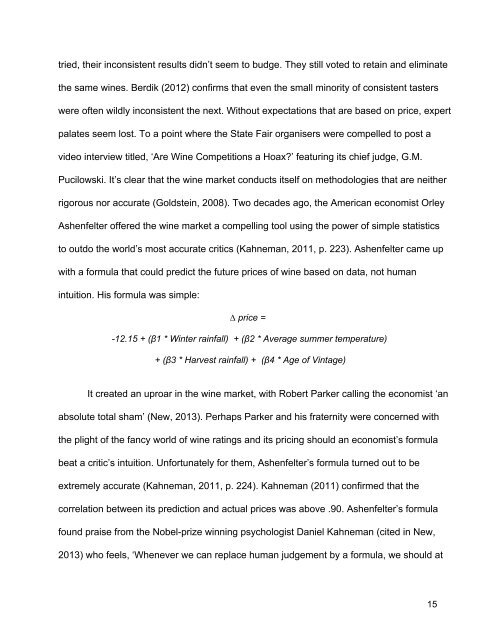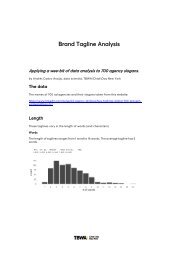The wine delusion
You also want an ePaper? Increase the reach of your titles
YUMPU automatically turns print PDFs into web optimized ePapers that Google loves.
tried, their inconsistent results didn’t seem to budge. <strong>The</strong>y still voted to retain and eliminate<br />
the same <strong>wine</strong>s. Berdik (2012) confirms that even the small minority of consistent tasters<br />
were often wildly inconsistent the next. Without expectations that are based on price, expert<br />
palates seem lost. To a point where the State Fair organisers were compelled to post a<br />
video interview titled, ‘Are Wine Competitions a Hoax?’ featuring its chief judge, G.M.<br />
Pucilowski. It’s clear that the <strong>wine</strong> market conducts itself on methodologies that are neither<br />
rigorous nor accurate (Goldstein, 2008). Two decades ago, the American economist Orley<br />
Ashenfelter offered the <strong>wine</strong> market a compelling tool using the power of simple statistics<br />
to outdo the world’s most accurate critics (Kahneman, 2011, p. 223). Ashenfelter came up<br />
with a formula that could predict the future prices of <strong>wine</strong> based on data, not human<br />
intuition. His formula was simple:<br />
∆ price =<br />
12.15 + (β1 * Winter rainfall) + (β2 * Average summer temperature)<br />
+ (β3 * Harvest rainfall) + (β4 * Age of Vintage)<br />
It created an uproar in the <strong>wine</strong> market, with Robert Parker calling the economist ‘an<br />
absolute total sham’ (New, 2013). Perhaps Parker and his fraternity were concerned with<br />
the plight of the fancy world of <strong>wine</strong> ratings and its pricing should an economist’s formula<br />
beat a critic’s intuition. Unfortunately for them, Ashenfelter’s formula turned out to be<br />
extremely accurate (Kahneman, 2011, p. 224). Kahneman (2011) confirmed that the<br />
correlation between its prediction and actual prices was above .90. Ashenfelter’s formula<br />
found praise from the Nobelprize winning psychologist Daniel Kahneman (cited in New,<br />
2013) who feels, ‘Whenever we can replace human judgement by a formula, we should at<br />
15




